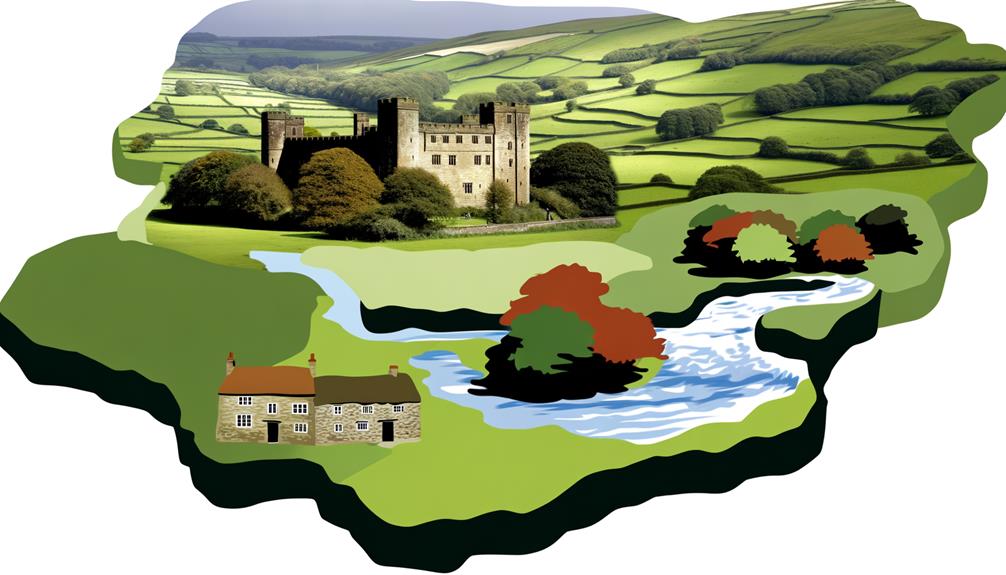Lancaster Name Meaning and Origin
The name Lancaster traces its roots to Old English and Latin, derived from 'Lune castrum,' meaning 'fort on the River Lune.' It is associated with Lancaster, England, and holds historical and socio-political weight, having emerged during the county's establishment in 1182. Known for its castles and involvement in the War of the Roses, Lancaster symbolizes regional pride and legacy.
It also features prominently in literature and has been carried globally due to migration. Prominent figures like John of Gaunt and Burt Lancaster highlight its significance.
If you explore further, you'll uncover its rich cultural and historical tapestry.

Key Takeaways
- Lancaster originates from the Latin 'castrum,' meaning fort or camp, combined with the River Lune.
- The name reflects the historical and socio-political significance of Lancashire, England.
- It grew in importance during the Middle Ages, notably in England's socio-political landscape.
- Literary and cultural references often depict Lancaster in power struggles and dynastic conflicts.
- Notable figures with the Lancaster name have made significant contributions in politics, education, and the arts.
Etymology of Lancaster
The etymology of the name Lancaster traces back to Old English and Latin origins, where it is believed to be derived from the Latin word 'castrum,' meaning fort or camp, combined with the River Lune, resulting in 'Lune castrum.'
This nomenclature reflects a fusion of linguistic influences, indicative of the historical Roman presence in Britain. Over time, 'Lune castrum' evolved phonetically and orthographically into Lancaster. The term 'castrum' was commonly used by the Romans to denote military sites, underscoring the strategic significance of the location.
This etymological development is emblematic of the broader cultural and historical transformations that shaped early English place names. Understanding this etymology provides a glimpse into the layered historical narratives embedded within the name Lancaster.
Geographic Roots
The name Lancaster is deeply intertwined with the historical county of Lancashire in England. The prominent town of Lancaster serves as a focal point of its origins. This name not only signifies geographic roots but also reflects the area's historical and socio-political significance.
Today, the surname Lancaster has spread globally. Yet its association with its English origins remains a critical aspect of its identity.
Historical County Significance
Rooted in the historic county of Lancashire in North West England, the name Lancaster carries a rich geographic heritage that dates back to medieval times. Lancashire, established as a county in 1182, became an important administrative and economic center.
The name 'Lancaster' itself is derived from the Roman fort “Castra” situated by the Lune River, highlighting the area's strategic significance. Throughout centuries, the county played a pivotal role in England's socio-political landscape, known for its castles, industrial revolution contributions, and the War of the Roses.
This historical backdrop imbues the Lancaster name with a profound association to the region's evolving identity, industrial prowess, and feudal legacies, making it a symbol of enduring legacy and regional pride.
English Town Origins
Lancaster's geographic roots can be traced to the eponymous town in Lancashire, where its name originated from the Roman fort 'Castra' by the Lune River, reflecting its historical and strategic significance in the region.
The town's establishment can be dated back to Roman Britain, indicating a well-fortified settlement with military and administrative functions. The name 'Lancaster' itself is a composite, combining 'Lune' (the river) and 'castra' (Latin for fort).
- Roman Heritage: The fort's presence established Lancaster as a key military outpost.
- Medieval Influence: The town grew in importance during the Middle Ages, particularly under Norman rule.
- Economic Development: Lancaster's strategic location facilitated trade and commerce, contributing to its economic evolution.
This origin underscores Lancaster's deep historical roots and enduring prominence.
Geographic Spread Today
Expanding from its historical origins in Lancashire, the name Lancaster has proliferated across various regions, signifying a rich geographic spread that transcends national boundaries.
In the United States, the name is prominently found in states such as Pennsylvania, Texas, and California, reflecting early migration patterns and settlement trends.
Additionally, Lancaster has a notable presence in Canada, Australia, and New Zealand, countries commonly associated with British colonial expansion.
European countries, including Ireland and Scotland, also show a significant distribution of the name, often linked to historical movements and intermarriages.
This widespread dissemination underscores the name's enduring legacy and adaptability, mirroring the mobility and interconnectedness of global populations over centuries.
Historical Significance
What makes the Lancaster name historically significant is its deep association with the English monarchy and its pivotal role in the Wars of the Roses, a series of dynastic conflicts that shaped the course of British history.
The name Lancaster is intrinsically linked to key historical events and figures that influenced the political landscape of medieval England.
Key aspects of its historical significance include:
- Royal Influence: The Lancastrian kings, particularly Henry IV, Henry V, and Henry VI, were central figures in English history.
- Wars of the Roses: The House of Lancaster's rivalry with the House of York led to prolonged civil strife.
- Cultural Legacy: The Lancastrian legacy has been immortalized in literature and drama, most notably in Shakespeare's historical plays.
The House of Lancaster
The House of Lancaster, a cadet branch of the Plantagenet dynasty, played a pivotal role in the political and military upheavals of 15th-century England. Its influence spanned several significant conflicts, most notably the Wars of the Roses, which were fought between the rival houses of Lancaster and York. The Lancastrian claim to the throne was initially established by Henry IV, who deposed Richard II. Henry VI, his son, faced continual challenges, culminating in his eventual downfall.
| Key Figure | Contribution |
|---|---|
| Henry IV | Established Lancastrian rule |
| Henry V | Military successes in France |
| Henry VI | Reign marked by instability |
The House of Lancaster's legacy is intertwined with England's medieval history, reflecting a period of dynastic struggle and transformation.
Cultural Impact
The name Lancaster has left a significant imprint on various cultural domains, ranging from its historic influence in shaping British monarchy to its frequent appearances in media and literature.
Historical events associated with the House of Lancaster have been dramatized in numerous films and television series, underscoring its enduring legacy.
Additionally, literary references to Lancaster in works such as Shakespeare's plays further illustrate its profound impact on cultural narratives.
Historic Influence
Throughout history, the name Lancaster has played a pivotal role in shaping cultural narratives and socio-political landscapes, particularly in England. Its influence emerged prominently during the Wars of the Roses, a dynastic conflict that pitted the House of Lancaster against the House of York, with a significant impact on English royal succession and governance.
The Lancastrian legacy also extends to architecture, with the construction of notable edifices like Lancaster Castle, which stands as a testament to medieval fortification and legal history. Additionally, the name has been immortalized in various geographical locations, from Lancaster County in Pennsylvania to the city of Lancaster in Lancashire, England.
Media Representations
Lancaster's enduring legacy is vividly reflected in various media representations, ranging from historical dramas to contemporary literature, each illuminating different facets of its rich cultural impact.
In film and television, the House of Lancaster, central to the Wars of the Roses, frequently serves as a backdrop for narratives exploring themes of power, loyalty, and conflict. Documentaries and historical series often dissect Lancaster's political and social influence, providing audiences with nuanced insights into its historical significance.
Additionally, Lancaster's name appears in numerous stage productions and visual arts, symbolizing heritage and authority. These portrayals collectively enrich public understanding of Lancaster's multifaceted legacy, demonstrating its lasting resonance in modern cultural consciousness.
Literary References
Literary references to the name Lancaster abound, revealing its profound influence on cultural narratives and historical discourse. The name features prominently in works of historical fiction and drama, often symbolizing power struggles and dynastic conflicts.
One notable example is Shakespeare's history plays, where the House of Lancaster plays a central role in the Wars of the Roses. Additionally, the name appears in modern literature, providing a rich backdrop for stories of intrigue and legacy.
- Shakespeare's “Henry VI” Trilogy: Chronicles the conflict between the Lancasters and Yorks.
- Philippa Gregory's “The Cousins' War” series: Explores the Lancastrian perspective on the Wars of the Roses.
- George R.R. Martin's “A Song of Ice and Fire” series: Draws inspiration from the Lancaster-York rivalry.
These examples underscore Lancaster's lasting literary significance.
Notable Figures
The name Lancaster has been associated with a number of notable figures across various fields, each leaving a distinct mark on history and culture. From royalty to the arts, individuals bearing this surname have contributed significantly to society. For example, John of Gaunt, the Duke of Lancaster, played a pivotal role in English politics during the 14th century. In the domain of cinema, Burt Lancaster emerged as a legendary actor in Hollywood. The following table presents a snapshot of notable Lancasters:
| Name | Field | Contribution |
|---|---|---|
| John of Gaunt | Royalty | Influential in 14th-century politics |
| Burt Lancaster | Cinema | Iconic Hollywood actor |
| Joseph Lancaster | Education | Pioneer in educational reform |
| Osbert Lancaster | Architecture | Renowned architectural historian |
These individuals illustrate the diverse impact of the Lancaster name.
Modern Usage
In contemporary society, the name Lancaster continues to be prevalent, manifesting in various sectors including commerce, academia, and media. Its enduring presence is evident in numerous ways:
- Commerce: The Lancaster name is associated with various successful enterprises, from luxury brands to local businesses.
- Academia: Lancaster University in the United Kingdom stands as a prominent institution, contributing significantly to global research and education.
- Media: The name is often highlighted in television and film, frequently used to evoke a sense of heritage and sophistication.
This multifaceted usage underscores the name's adaptability and enduring appeal. A thorough analysis reveals that Lancaster remains a symbol of quality, tradition, and intellectual achievement, resonating with diverse audiences and maintaining its relevance across different domains.
Conclusion
To sum up, the name 'Lancaster' arises from a rich tapestry of linguistic, geographic, and historical threads, interwoven with regal tales and cultural imprints.
One might jest that bearing such a name bestows an air of aristocracy and historical gravitas, yet modern usage often sees it adorning everything from universities to insurance companies.
Therefore, the grandiosity of Lancaster's legacy finds itself paradoxically juxtaposed with the mundane, a proof of its enduring versatility and timeless appeal.






